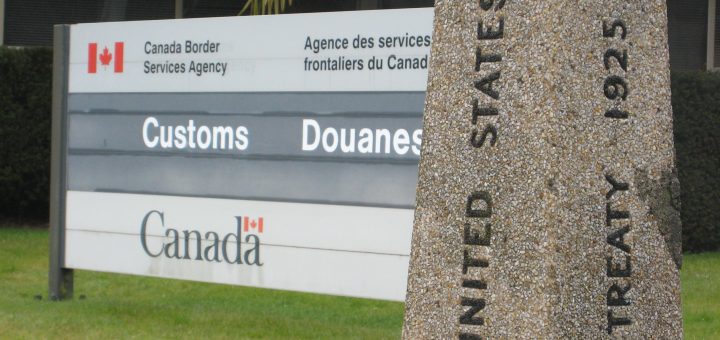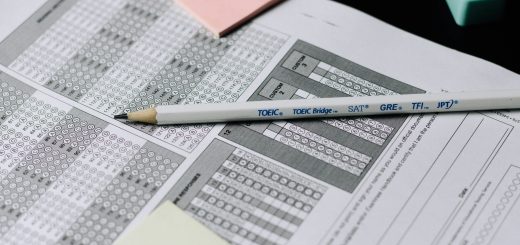R v Canfield: Unrestricted Searches of Digital Devices at the Border Declared Unconstitutional

Over the past decade, personal electronic devices (“PEDs”) such as cell phones, tablets, and laptops have become mobile security safes for individuals’ core biographical and personal information. They contain banking information, credit card numbers, health data, private correspondence, and personal photos, all locked away by a single password. Having another person, especially a government official, search one’s device without any suspicion or reasonable grounds to do so could very well feel like an invasive intrusion into one’s private life.
In R v Canfield, 2020 ABCA 383 [Canfield], a unanimous panel of the Alberta Court of Appeal (“ABCA”) held that border officials’ examination of travellers’ goods upon entry into Canada, pursuant to s. 99(1)(a) of the Customs Act, RSC 1985, c 1, is unconstitutional insofar as the meaning of “goods”—defined under s. 2 of the Act as “any document in any form”—includes the contents of PEDs. More specifically, if a Canadian Border Services Officer (“BSO”) conducts a routine search of a traveller’s goods and examines, without reasonable grounds for suspicion, the contents of a traveller’s PED, this violates the protection against unreasonable search and seizure under s. 8 of the Canadian Charter of Rights and Freedoms [Charter]. In declaring the definition of “goods” under s. 2 of the Customs Act to be of no force or effect in its application to s. 99(1)(a) with respect to the search of PEDs, the ABCA’s decision will certainly have a substantial impact on travellers’ expectations of privacy at the border.
Factual Background and Trial Decision
The two accused in this case, Sheldon Canfield and Daniel Townsend, arrived on separate occasions at Edmonton International Airport after travelling outside the country. Upon arriving at customs, both individuals, based on certain “indicators” determined by BSOs—such as odd demeanour, unique travel itinerary, and any noteworthy declarations (Canfield, para 9)—were referred to secondary screenings for further questioning. In their interrogation of Mr. Canfield, who was returning from Cuba, the BSOs formed the view that he was a “sex tourist.” The BSOs asked whether he had any images of child pornography on his cell phone, to which Mr. Canfield responded that he did. Following a search of his phone where they found such images, he was arrested (Canfield, para 10). Mr. Townsend, who had arrived from Seattle, was found over the course of his examination to have 12 electronic devices, including a laptop which, after providing his password to the BSO, contained images of child pornography. Mr. Townsend was subsequently arrested (Canfield, para 11).
Mr. Canfield and Mr. Townsend’s respective cases were jointly heard before the Court of Queen’s Bench of Alberta. The trial judge was asked to determine whether (1) the search of PEDs pursuant to s. 99(1)(a) of the Customs Act violates the Charter, (2) whether the obtaining of evidence of child pornography on the accused’s devices constituted a breach of ss. 7, 8, 10(a) and 10(b) of the Charter, and, (3) if so, whether the evidence should be excluded under s. 24(2) of the Charter (Canfield, para 2). Additionally, the trial judge was asked to revisit R v Simmons, [1988] 2 SCR 495 [Simmons], the authority on the requisite level of personal privacy afforded to individuals at the border, and “consider whether [PEDs] can be routinely searched at the border, without engaging the Charter rights of those being searched” (Canfield, para 7). The trial judge declined to revisit the case. He ultimately found that s. 99(1)(a) was constitutional, that the evidence of child pornography on the accused’s devices was not obtained in breach of the Charter, and that even if there was a breach, the evidence should not be excluded under s. 24(2) of the Charter (Canfield, para 5). The two accused consequently appealed.
ABCA Decision
The Constitutionality of s. 99(1)(a) of the Customs Act
The ABCA was quick to find that the trial judge erred in failing to revisit the Supreme Court of Canada’s (“SCC”) ruling in Simmons. In that case, the SCC identified three distinct types of border searches, in ascending order of the required level of constitutional privacy protection: (1) routine questioning that every traveller is subject to at a port of entry; (2) a strip or skin search; and (3) a body cavity search (Canfield, para 3). The ABCA found that the fundamental changes in the use of technological devices since Simmons, in addition to growing jurisprudence that “govern[s] an individual’s reasonable expectations of privacy in their [PEDs] and searches of such devices in the domestic context,” meant that the case should be revisited (Canfield, paras 37-38). In particular, because searches conducted by border officials under s. 99(1)(a) of the Customs Act would fall under the first category of searches identified in Simmons, and would thus attract no constitutional protections, there ought to be a greater distinction between the reasonable expectation of privacy with respect to the search of PEDs and the search of other kinds of goods at the border (Canfield, para 23-24).
Consequently, the ABCA held that s. 99(1)(a), insofar as it provides border officials with a limitless power to search individuals’ PEDs, violates s. 8 of the Charter. In its current drafting, s. 99(1)(a) does not mention that a BSO must have reasonable grounds or suspicion before conducting a search of a traveller’s goods. This unrestricted power clearly troubled the ABCA, which found that while a search of a PED may not be akin to that of a bodily or strip search, “it may nevertheless be a significant intrusion on personal privacy,” and therefore requires an appropriate threshold to be met before a BSO can conduct such a search (Canfield, para 75). The ABCA did not indicate what threshold should be used, and instead left this matter to be determined by Parliament and in future cases (Canfield, para 75).
Additionally, the ABCA held that the s. 8 violation is not a reasonable limit under s. 1 of the Charter. It is interesting that the ABCA even engaged in such an analysis since experts have noted that where Charter rights that use the word “reasonable” (such as s. 8) have been violated, it is difficult to conceive of a reasonable limit on otherwise unreasonable conduct. Nevertheless, while the ABCA found that s. 99(1)(a) contains a pressing and substantial objective to maintain border security and protect national interests against the importation of illicit goods, and is rationally connected to these objectives (Canfield, paras 85 and 90), it failed the latter two portions of the proportionality assessment. Specifically, the lack of any threshold requirement for conducting a search of a PED is not minimally impairing, especially as the objectives of the Customs Act could still be achieved “if additional safeguards are put in place to protect individuals from unnecessarily intrusive searches of their [PEDs]” (Canfield, paras 102 and 109). As a result, the definition of “goods” under s. 2 of the Customs Act was declared of no force or effect insofar as its meaning includes PEDs for the purposes of searches conducted under s. 99(1)(a), with a one-year suspension of the declaration (Canfield, paras 111–112).
Violations Under Sections 8, 10, and 7 of the Charter
With respect to the Charter violation claims brought by Mr. Canfield and Mr. Townsend, the ABCA found that the accused’s rights under ss. 8, 10(a), 10(b), and 7 were breached. Having already concluded that s. 99(1)(a) violates s. 8 of the Charter, the ABCA quickly determined that the accused’s rights had also been breached since their PEDs were searched (Canfield, para 116). With respect to ss. 10(a) and (b), the ABCA found that the accused were not properly informed of the reasons for their detention, nor were they informed of their right to retain counsel. In particular, the ABCA concluded that “[d]etention occurs when the inquiry moves from ‘routine questioning’ to a more intrusive form of inquiry, initiated on the basis of a sufficiently strong particularized suspicion and with significant legal consequences” (Canfield, para 128). For Mr. Canfield, this transition occurred once he confirmed that he was in possession of child pornography and the BSO began searching the contents of his phone (Canfield, para 132). For Mr. Townsend, the examination triggered s. 10 once the BSO asked for his laptop password and began searching his device (Canfield, para 135). In both cases, the ABCA held that the accused ought to have been informed of their s. 10 rights.
The ABCA also found that the accused’s s. 7 rights, specifically their right to be protected against self-incrimination (a principle of fundamental justice), “was violated by the use at their criminal trial of certain information they provided to the BSOs in the course of the secondary screening process” (Canfield, para 138). Once Mr. Canfield and Mr. Townsend were asked by BSOs to provide access to search the contents of their devices, thus commencing a more intrusive inquiry, the ABCA found that any statements made past these points were protected by the principle against self-incrimination (Canfield, paras 153–54). The ABCA determined that s. 7 is not engaged by routine questioning upon entry into the country, but rather where a traveller is compelled by statute to answer questions and is detained, or has their privacy substantially interfered with. Both of these events occurred in this case. Therefore, the admission of the ensuing statements into court breached the principle against self-incrimination.
Exclusion of Evidence Under s. 24(2) of the Charter
As the accused had successfully established that their Charter rights had been breached, the ABCA turned its analysis to whether the evidence of child pornography obtained as a result of the violations should be excluded pursuant to s. 24(2) of the Charter. The ABCA reached the same conclusion as the trial judge in finding that, on balance, the factors in favour of admission outweighed those in favour of exclusion (Canfield, para 184). While it found that the Charter violations were significant, there was a strong argument to be made for society’s interest in seeing a full and fair trial take place because the BSOs acted in the good faith belief that their actions were authorized by the Customs Act and the crimes committed by the accused involved the safety of children (Canfield, paras 160–82). It is noteworthy that the ABCA did not consider the possibility that society has a strong interest in keeping digital information private, nor how that interest might be better served through exclusion of the evidence, especially given that the ABCA had spent so much of the decision analyzing the high value individuals place on their digital privacy. Nevertheless, the admission of evidence led the ABCA to uphold the accused’s convictions and dismiss the accused’s requests for new trials.
The Road Ahead
Overall, Canfield is a positive development in the protection of privacy with regard to PEDs in the border context. In particular, in finding that the accused’ ss. 7, 8 and 10 rights had been breached, the ABCA’s decision touches on the vulnerable position in which individuals may find themselves upon being compelled by officials to produce compromising information on their PEDs. As Steven Penney observes, producing personal, digital information to a border official “[e]ven if it is not incriminating…may be highly stigmatizing and damage people’s sense of autonomy, security, and self-determination.” It is critical that the courts continue to be alive to the high expectation of privacy individuals have in respect of their digital information and consider that, even in environments where security and public safety are at the fore, the contents of PEDs should continue to receive some degree of constitutional protection.
Going forward, with the ABCA’s order of a suspension of invalidity, it is highly possible that the Crown may pursue leave to appeal Canfield to the SCC. Regardless of whether the case is appealed, it is critical that either Parliament or the SCC provide a clearly delineated threshold that border officials must meet in order to conduct a search of a traveller’s PED. The threshold should not only be made clear in the SCC’s decision or a redrafted s. 99(1)(a), but also in guidelines for border officials. These changes are necessary to ensure that digital examinations at customs will not become what Penney deems a “back door” to individuals’ highly personal information.
Featured image is found here.







Join the conversation